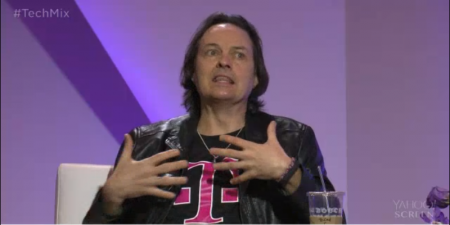Ok, maybe that’s a little harsh. But watch this video of T-Mobile CEO John Legere boasting that’s he’s “spent a lot of time in Washington lately, with the new chairman of the FCC,” and that “they love T-Mobile.”
Ah, spring. Love is in the air. Great for twenty-somethings, not so great for federal agencies. The FCC, however, is thinking about handing over valuable wireless spectrum to T-Mobile and denying it to T-Mobile’s rivals. This type of industrial policy is partially responsible for the sluggish economy.
From taxpayer subsidies for connected Wall Street banks to favored green energy firms with the right political allies, cronyism prevents the best firms from serving consumers with the best products in the most efficient way. Cronyism is good (at least temporarily) for a few at the top. But it hurts everyone else. Government favors ensure that bad ideas and business models are supported even if they would have proved wanting in a more neutral market. They transfer scarce taxpayer dollars to friends and family. They also hurt firms who aren’t fortunate enough to have the right friends in the right places at the right time. It’s hard to compete against a rival who has the backing of Washington. The specter of arbitrary government then hangs over the economy as firms and investors make decisions not on the merits but on a form of kremlinology — what will Washington do? In the case at hand, cronyism could blow up the whole spectrum auction, an act of wild irresponsibility in the service of a narrow special interest (we’ve written about it here, here, and here).
The U.S. has never been perfectly free of such cronyism, but our system was better than most and over the centuries attracted the world’s financial and human capital because investors and entrepreneurs knew that in the U.S. the best ideas and the hardest work tend to win out. Effort, smarts, and risk capital won’t be snuffed out by some arbitrary bureaucratic decision or favor. That was the stuff of Banana Republics — the reason financial and human capital fled those spots for America, preferring the Rule of Law to the Whim of Man.
The FCC’s prospective auction rules are perplexing in part because the U.S. mobile industry is healthy — world-leading healthy. More usage, faster speeds, plummeting prices, etc. Why risk interrupted that string of success? Economist Hal Singer shows that in the FCC’s voluminous reports on the wireless industry, it has failed to present any evidence of monopoly power that would justify its rigging of the spectrum auctions. On the other hand, an overly complex auction could derail spectrum policy for a decade.


